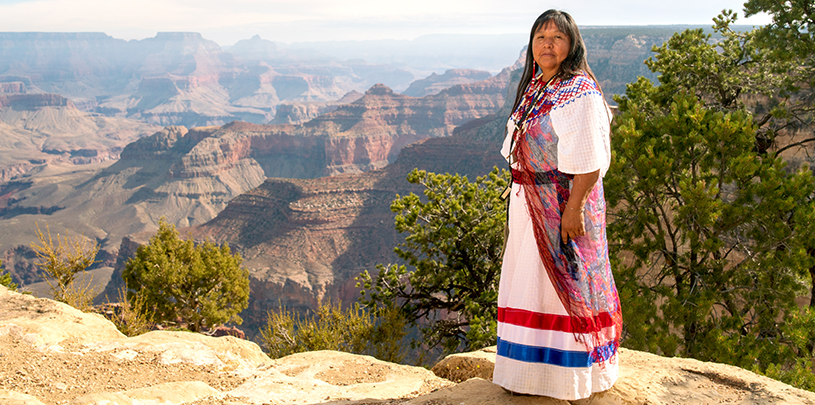
 by Sarana Riggs, Grand Canyon Manager
by Sarana Riggs, Grand Canyon Manager
As we mark the 102nd anniversary of Grand Canyon National Park on February 26, 2021, we continue to reflect on its past. The Grand Canyon’s ancient history is visible in the colorful layers of time stacked a mile high. Its recent history primarily recounts stories of explorers, brave adventurers, and many others who are acknowledged for their contributions in shaping and creating a park for all to see and enjoy.
But there’s a gap in that simplified historical record, between the ancient rock layers and the past 102 years of Grand Canyon National Park, where Native peoples and their ancestors have lived and still breathe today. A group of Native voices is working to bridge that gap.
In advance of the park’s centennial anniversary in 2019, the Intertribal Centennial Conversations Group formed to reflect on the past and chart a new vision for the second century of Grand Canyon National Park. The group, comprised of dozens of individuals from Hualapai, Havasupai, Zuni, Hopi, Southern San Juan Paiute, Navajo, and other Grand Canyon tribes, presented 40 recommendations to the park service and other partners on how to better engage with tribes during the centennial year. But the group didn’t stop there. Today, it continues to put Native voices at the forefront of education, interpretation, and stewardship of the Grand Canyon.
The National Park Service acknowledges 11 affiliated tribes with cultural connections to the Grand Canyon. We see the remnants of their ancestral history from thousands of years ago in cliff dwellings, rock art, and other cultural sites. But to us Indigenous peoples, we have been here since the creation of time.
That means 11 different identities with unique oral and written histories, passed down from generation to generation. These knowledges tie Indigenous peoples to shared cultural landscapes below, above, and beyond the rims of the Grand Canyon.
We also have our own perspectives of Grand Canyon National Park’s history in combination with what has happened to Indigenous tribes in the United States. That is a history of colonization, oppression, and cultural, land, and water loss — all while being indoctrinated and assimilated into a new Western ideology.
In 2019, the Intertribal Centennial Conversations Group came together to reflect on all this history — from our origins to present day — and talk about the future, knowing that we leave behind a continued legacy to protect and preserve our languages, as well as our cultural identities and shared cultural knowledge. With traumatic histories passed down through generations, we learned and continue to heal from the past, acknowledging all that has happened to reshape and shift into a moment where our voices will be heard.
Within the Intertribal Centennial Conversations Group, we focus on three main topics: education, stewardship, and economic development.
Our top priority has been to develop an educational model that represents all 11 tribes of the Grand Canyon, so that park staff, river guides, hiking guides, and park visitors have a deeper respect for this place we call home. We’ve presented at several interpretive training seminars and symposiums. Last year, we launched The Voices of Grand Canyon, a collection of videos, stories, photos, and audio about cultural connections to the canyon. In sharing our perspectives, we don’t want to give misconceptions and misrepresentations as some Hollywood Indian, but we would like to be authentic in sharing our self-identities and cultural connections to this vast landscape.
View in full screen (suggested for optimal experience, especially mobile)
We would also like to hear your input and ask, what do you want us to share?
Alongside education, we look at current stewardship practices between tribal leaders and land-management agencies at the state or federal levels in regards to cultural or environmental protections. How do we, as tribal members who surround the park boundaries in neighboring communities, have a voice in the management of the park? The group has made a long-term commitment to improve stewardship of the Grand Canyon by incorporating traditional knowledge into management of the park and surrounding public and tribal lands.
From the Indigenous perspective, how do we talk about creating revenue for our communities and supporting our families by tapping into the tourism surrounding the Grand Canyon, while maintaining and respecting our cultural beliefs? How do we share the authenticity of who we are in our art or small businesses? All while respecting and knowing that the canyon is our place of emergence, our place of prayer, and our home? This is a big topic, and we are happy to share that the group will host the Grand Canyon Economic Summit (tentatively scheduled for fall 2021) for all Indigenous and culturally minded individuals. This summit will be held at the South Rim in collaboration with Grand Canyon National Park, Grand Canyon Conservancy, and many others.
In a time of uncertainty, we are seeing a need for change, truth, and acknowledgment. It is with this awareness that we share our true histories and look forward to a brighter future for all our youth. I look forward to what lies ahead.
80% of Arizona voters support Baaj Nwaavjo I'tah Kukveni National Monument, according to a new poll.
Read MoreThe Colorado River below Glen Canyon Dam is heating up. Find out why.
Read MoreGroundwater pumping at a uranium mine near the Grand Canyon will affect the canyon's springs, scientists says.
Read More